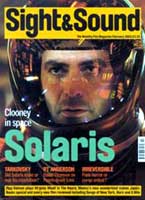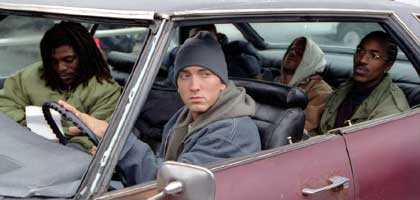
In the ghetto
Film of the Month: 8 Mile

8 Mile replaces Eminem's trademark rage with tenderness. Ryan Gilbey asks if it's a step too far.
No performer since David Bowie in the 1970s has better exploited the actorly impulses at the heart of pop music than hip-hop star Eminem. Shuffling a deck of alter egos (alongside his stage name he invokes his birth name Marshall Mathers III and the 'Id' figure of Slim Shady), he plays out in musical form audacious multi-character dramas. He inhabited the damaged mind of one of his own psychotic fans in the tragic 'Stan', while his most toxic work to date is 'Kim', in which he portrays both himself and the mother of his daughter in a harrowing revenge fantasy that doesn't so much cross the border between performance and autobiography as eradicate it.
It is in this territory that Eminem's film acting debut is located. 8 Mile has parallels with the rapper's own early years: his character, Jimmy Smith, Jr, nicknamed Rabbit, has been raised by an unstable mother in a trailer park on the 8 Mile Road which divides Detroit's predominantly black inner city from its affluent white suburbs. A cursory knowledge of Eminem is no prerequisite to an appreciation of the film, though it can make certain scenes more pointed or pleasurable. It's charming when a sugary lullaby comes out of that salty mouth. And hearing the rapper, who has been accused in the past of homophobia, deliver with sincerity the line "OK folks, enough with the gay jokes" is a simple joy, topped only by the moment when Kim Basinger, as Jimmy's mother Stephanie, all chip-pan hair and leaky-biro eyes, sprawls drunkenly on the bed and complains "I gotta get to bingo!", banishing in an instant all memories of her being smeared with the contents of Mickey Rourke's refrigerator.
Freed from his on-stage accoutrements of chainsaw and Friday the 13th ski-mask, not to mention hip-hop's inbuilt braggadocio, Eminem reveals himself to be a strikingly charismatic presence. He has already rapped about the power of his own baby-blue eyes, and he uses them here to devastating effect, conveying vulnerability with a simple well-timed blink or wince. Chances are his natural radiance would have shone through in any piece of junk the studio had thrown at him. Still, he is as lucky to have fallen into the hands of Curtis Hanson as Bowie was to be shepherded on screen by Nicolas Roeg in The Man Who Fell to Earth (1976).
Hanson is a weighty film-maker with an uncommonly light touch: he didn't so much direct Meryl Streep in The River Wild as emancipate her, while few other film-makers could have made such breezy work of unpicking the knots in L.A. Confidential and Wonder Boys. It may be Hanson's work with Samuel Fuller that most strongly informs the mood of 8 Mile. They collaborated on the script for Fuller's 1981 anti-racist parable White Dog, and as well as inheriting that director's straight-arrow approach towards characters who might be dismissed in other movies as 'Thug 1' and 'Thug 2', Hanson also demonstrates dexterity with contentious themes. The unusual racism Jimmy experiences as a white man excelling in a largely black artform is quietly absorbed into the film's fabric. He endures frequent taunts about Elvis Presley, a reference to that singer's appropriation of black music, but the real divisions here are economic, not racial. In the final showdown, in which rappers compete to denigrate one another in the wittiest fashion, Jimmy redefines the contest as a class war, exposing his African-American opponent as a former private-school pupil whose parents "have a real good marriage."
While 8 Mile was brought to the screen by Hanson and his writer Scott Silver (Johns, 1995), these episodes are consistent with Eminem's own preoccupations. He's no dope when it comes to identifying the complex tensions that underpin his popularity, as well as his controversy. In 'White America' he raps: "Let's do the math/If I was black, I would've sold half... Surely hip-hop was never a problem in Harlem, only in Boston/After it bothered the fathers of daughters starting to blossom."
The film nods in the direction of these contradictions but isn't best placed to explore them. The prevailing tone here is soothing rather than confrontational: 8 Mile is pitched at a mainstream audience, to whom the taunting, provocative Eminem would be a threat rather than a figure of empathy. It could be that the film-makers have gone to the other extreme in buffing the rapper's rough edges. Jimmy is adored by children, respected by his peers and desired by even the most insignificant characters.
Further comfort is provided by the use of Eminem's own slickly produced songs thumping out of Jimmy's headphones. In a narrative context this is evidently a projection of Jimmy's ambition - his dream of the music he will one day make. But these songs drain the film of suspense. You hear them in the opening scene, as Jimmy prepares backstage for his first contest, and you feel instantly reassured. Of course Jimmy will be fine in the end, the music tells you. He'll be more than fine - he'll be Eminem. A flashforward to Jimmy's future success at the MTV awards couldn't have been any more placatory than the sound of that lucrative and familiar fury. But there are compromises and compromises, and the use of Eminem songs in a film starring Eminem, and co-produced by his manager and his record label, must count as only the most minor of infractions.
It helps that Hanson hasn't surrendered to the conventions of that youthful subgenre, the hip-hop movie. Cinematographer Rodrigo Prieto, who shot Amores perros, works from a palette of industrial and jaundiced colours - factory greys, cadaver blues, bile yellows - which strongly substantiate Jimmy's dreams of escape. There's no crime apart from the mention of a rape, which in turn leads to an arson attack on the abandoned house where that rape took place. And there are no drugs either, and only two guns, one of which fires paintballs. Admittedly Jimmy does have unprotected sex with a girl, Alex, whom he hardly knows - and among heavy machinery at that, which should earn the film a double don't-try-this-at-home warning.
But the lack of drive-by shootings and crack houses doesn't jolt you; it's just another instance of Hanson not playing by the rules. 8 Mile may have corniness in its bones, but there are ambiguities enough here for a whole other movie. The sexual undertones between Jimmy and his mother are subtly alarming, and not restricted to the erotic bedroom tussle that plays like a scene from a trailer-park Hamlet. We know this relationship has a cargo of unhealthy secrets long before Stephanie confesses her sexual problems to an appalled and shirtless Jimmy. Their first scene together comes when Jimmy bursts in on his mother and her boyfriend Greg having sex. A subsequent replay, in which Jimmy finds his friend Wink in identical circumstances with Alex, only reinforces the bizarrely smudged divisions between the women in Jimmy's life.
No wonder you brace yourself for the possible disclosure that young Lily will turn out to be Jimmy's daughter as well as his sister. That revelation never arrives, but the fact that it would not be out of place is typical of the lingering mysteries that leave 8 Mile equipped to transcend the pulpy excitement of its let's-put-on-the-show-right-here finale. As a movie it may have squeezed out its star's trademark rage along with his platinum crop-cut. Paradoxically it is the tenderness that is exposed in its place that makes the film an illuminating addition to that hall-of-funhouse-mirrors that is Eminem's persona.
